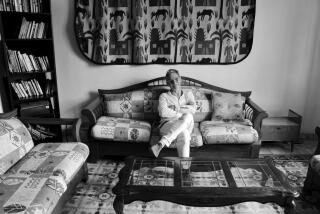Azores writer joins ‘World’ of magical storytelling
- Share via
It’s gotten to the point of being a cliche: Whenever an author engages in some form of storytelling magic that involves levitating priests or a rain of flower petals, critics dub him a literary offspring of Gabriel Garcia Marquez. The South American maestro is cited so often, in fact, that he’s fathered more children than Methuselah.
And though it’s certainly right to honor the great Colombian novelist for his influence, such claims risk overshadowing the original vision of a writer such as Azorean novelist Joao de Melo in “My World Is Not of This Kingdom.”
Raining down upon the rough-hewn imaginary island town of Rozario in this story are the cosmic forces of the Book of Genesis, of God in the howling wind -- the first pages are a helicopter flyover of the island’s volcanic landscape, pounded and molded “as if someone had long ago shaped its uncertain and discontinuous surface on a lathe.”
In this forbidding, primitive world, among nests of salamanders and craters filled with cool water, the town’s first settlers realize that such empty places offer a chance to start afresh. Soil is broken and tilled and house walls rise, made of a cement “like clay kneaded with blood.” As these simple people come in contact with the outside world, however, as technology and church dogma arrive on the backs of mules, they move east of Eden, further out of sync with the land that they revered.
One finds plenty of magical occurrences here -- a resurrected beggar, for instance, or weeping animals and a rain that lasts 99 days -- but none of these is overdone, and they offer a vivid contrast to the dull, petty grabs for power that motivate such characters as Father Governo, the mayor Goraz, and even the earnest healer Cadete. Governo lays claims on the people’s spiritualism as Goraz does to their public behavior and lands. Even Cadete, obsessed with fighting plagues, loses his intentions in a desire to conquer death.
De Melo’s love for his homeland of the Azores, an island chain like “a fly speck” dropped on the “almost always greenish back of the Atlantic,” courses through these pages. Though adults look on the ocean and feel claustrophobic, the children are in awe of the sea, which “had all the fascination of nights with a white moon, lights sparkled on its convex surface and a smell of fishing rose up the slopes and shouted out in the voice of shearwaters....” Perhaps De Melo himself first experienced the power of storytelling by these waters, when the “heroes from the lighted ships spoke of their journeys to the ends of the earth....”
The novel’s second half follows the trials of the farmer Joao-Maria, who loses his land to Goraz and then his wife, Sara, to illness. Crushed, he can’t kill himself -- his boys Jorge-Maria and Jose-Maria need him. But the loss of their mother and their father’s unhappiness have an unsettling effect on the boys, especially little Jorge: Other children on the island grow up, but he remains a child. Cadete fails to cure him while Joao-Lazaro, the beggar risen from the dead, locates the answer inside the father: “You’ve transferred your hurry to die to your sons and that doesn’t help their relationship to growth,” he scolds him.
Almost as spectacular as the book itself is its publishing history. Translated by the preeminent Gregory Rabassa, the man who made Garcia Marquez, Julio Cortazar and many other Latin American writers first boom in English ears, it was the “most astonishing novel [Rabassa] had read since ‘One Hundred Years of Solitude,’ ” writer Katherine Vaz says in an introduction.
And yet the publisher turned out to be Minneapolis-based Aliform Publishing -- not a giant such as HarperCollins or Simon & Schuster. How could such a gem escape their grasp? At a time when big publishers are seeking sure things, the risk seems on the shoulders of small publishers. With “My World,” readers should be thankful Aliform took that chance.
More to Read
Sign up for our Book Club newsletter
Get the latest news, events and more from the Los Angeles Times Book Club, and help us get L.A. reading and talking.
You may occasionally receive promotional content from the Los Angeles Times.










